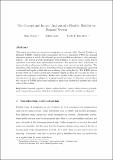The concept and impact analysis of a flexible mobility on demand system
Author(s)
Song, Xiang; Ben-Akiva, Moshe E; Atasoy, Bilge; Ikeda, Takuro
DownloadWorking Paper (2.567Mb)
PUBLISHER_CC
Publisher with Creative Commons License
Creative Commons Attribution
Terms of use
Metadata
Show full item recordAbstract
This paper introduces an innovative transportation concept called Flexible Mobility on
Demand (FMOD), which provides personalized services to passengers. FMOD is a demand
responsive system in which a list of travel options is provided in real-time to each passen-
ger request. The system provides passengers with flexibility to choose from a menu that is
optimized in an assortment optimization framework. For operators, there is flexibility in
terms of vehicle allocation to different service types: taxi, shared-taxi and mini-bus. The
allocation of the available fleet to these three services is carried out dynamically so that
vehicles can change roles during the day. The FMOD system is built based on a choice
model and consumer surplus is taken into account in order to improve passenger satisfac-
tion. Furthermore, profits of the operators are expected to increase since the system adapts
to changing demand patterns. In this paper, we introduce the concept of FMOD and present
preliminary simulation results. It is shown that the dynamic allocation of the vehicles to
different services provides significant benefits over static allocation. Furthermore, it is
observed that the trade-off between consumer surplus and operator’s profit is critical.
The optimization model is adapted in order to take into account this trade-off by control-
ling the level of passenger satisfaction. It is shown that with such control mechanisms
FMOD provides improved results in terms of both profit and consumer surplus.
Date issued
2015-05Department
Massachusetts Institute of Technology. Department of Civil and Environmental Engineering; Sloan School of ManagementJournal
Transportation Research Part C: Emerging Technologies
Publisher
Elsevier
Citation
Atasoy, Bilge, Takuro Ikeda, Xiang Song, and Moshe E. Ben-Akiva. “The Concept and Impact Analysis of a Flexible Mobility on Demand System.” Transportation Research Part C: Emerging Technologies 56 (July 2015): 373–392.
Version: Original manuscript
ISSN
0968090X